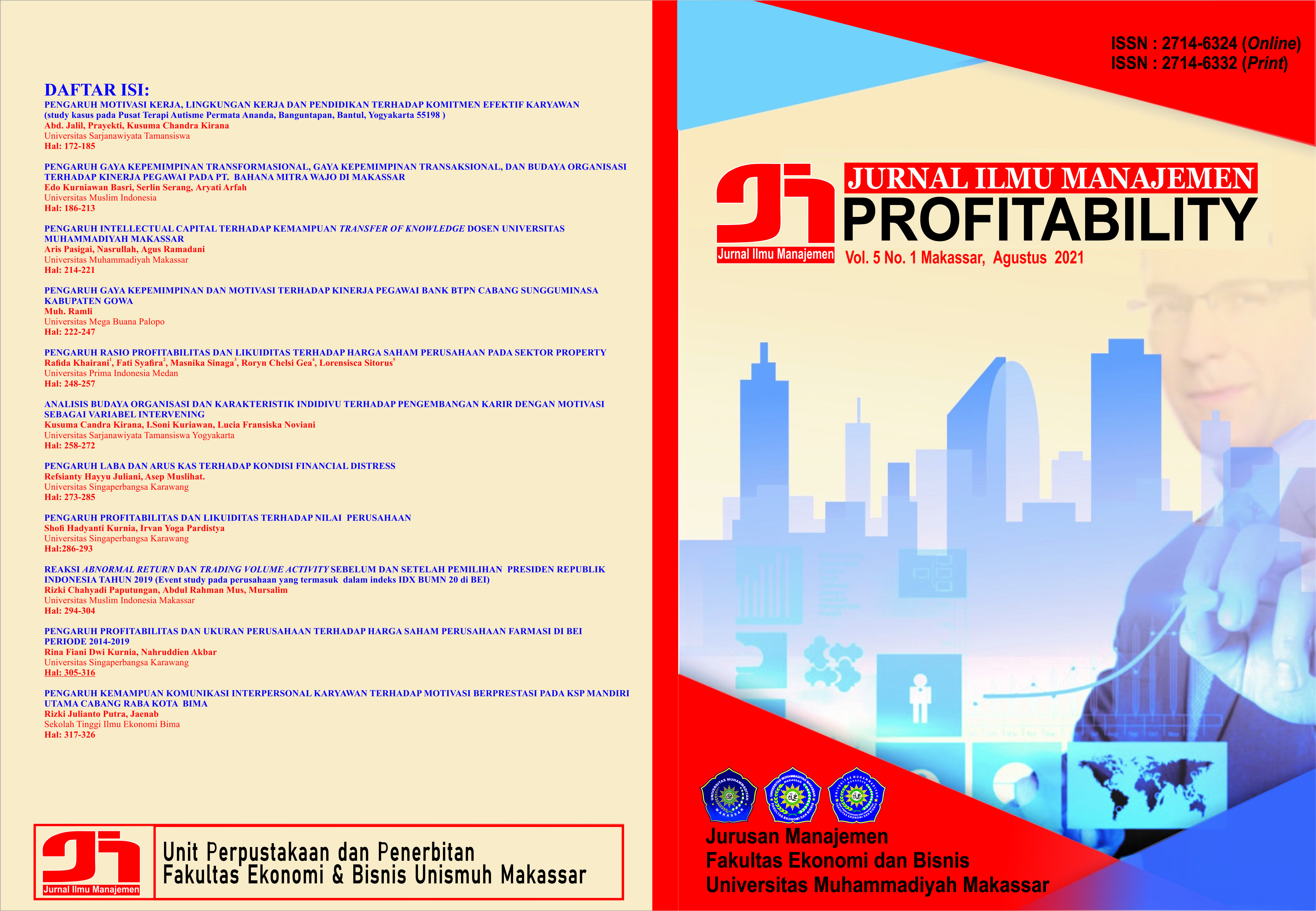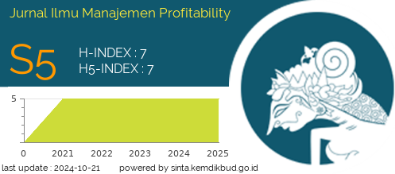THE EFFECT OF SOCIAL MEDIA USE ON STUDENTS FINANCIAL MANAGEMENT BEHAVIOR WITH SELF CONTROL AS A MODERATING VARIABLE
DOI: https://doi.org/10.26618/profitability.v6i1.6963
Use of Social Media, Self Control, Student Financial Management Behaviour
Abstract
This study aims to examine the effect of using social media on financial management behaviour with self-control as a moderating variable. This type of research is a quantitative research. Data collection in this study used primary data by distributing questionnaires to student of the ecocomics faculty of the University of Sarjanawiyata Tamansiswa Yogyakarta. The technique used in sampling is convenience sampling. Data collection is done by spreading the google form link through the whatsapp application to student. The number of questionnaires that were processed were 100 questionnaires. Data were analyzed using path analysis. The result showed that the use of social media had no effect on student financial management behaviour. Self control cannot strengthen the positive effect of using social media on student financial management behaviourReferences
Ajzen. (1991). The theory of planned behavior. Organizational Behavior and Human Decision Processes, 50(2), 179–211.
Ajzen, I. (2005). Attitudes, Personallity and Behavior. International Journal of Strategic Innovative Marketing, Vol. 3, pp. 117–191.
Ardiana, Meta. (2016). Pengaruh Kontrol Diri, Jenis Kelamin, dan Pendapatan Terhadap Pengelolaan Keuangan Pribadi Mahasiswa. Jurnal Ekonomi Pendidikan dan Kewirausahaan, Vol. 4, pp. 59–75.
Azaria, Candra. (2020). Pengaruh Literasi Keuangan, Kecerdasan Emosional, Lingkungan Keluarga, dan Media Sosial Terhadap Perilaku Keuangan Siswa Kelas XI dan XII SMA Negeri 2 Kebumen. Journal of Chemical Information and Modeling.
Karaa, I. E. (2016). Determining Advanced and Basic Financial Literacy Relations and Overconfidence, and Informative Social Media Association of University Students in Turkey. Journal Educational Sciences: Theory and Practice
Khoiriyah, Ummamatul. (2020). Pengaruh Peer Group, Literasi Ekonomi dan Penggunaan Media Sosial terhadap Perilaku Konsumtif Siswa Jurusan IPS SMA Negeri di Kabupaten Brebes. Fakultas Ekonomi Universitas Negeri Semarang
Kurniawan, Beni. (2019). Kontrol Diri Dalam Penggunaan Media Sosial. Fakultas Keguruan dan Ilmu Pendidikan Universitas Sanata Dharma Yogyakarta.
Mariastinik, F. H. (2017). Menguji Tingkat Pengetahuan, Sikap, dan Perilaku Keuangan Pribadi Mahasiswa. Fakultas Ekonomi Universitas Islam Negeri Maulana Malik Ibrahim Malang.
Maulana, Irfan. (2020). Pengaruh Social Media Influencer Terhadap Perilaku Konsumtif di Era Ekonomi Digital. Majalah Ilmiah Bijak, 17(1), 28–34.
Nasihah, Dzurrotun. (2019). Pengaruh Pembelajaran Akuntansi Keuangan, Literasi Keuangan, dan Kontrol Diri Terhadap Perilaku Keuangan Mahasiswa Fakultas Ekonomi Universitas Negeri Surabaya. Jurnal Pendidikan Akuntansi (JPAK) UNESA, 7(3), 336–341.
Nur Assyfa, L. (2020). Pengaruh Uang Saku, Gender dan Kemampuan Akademik Terhadap Perilaku Pengelolaan Keuangan Pribadi Mahasiswa Akuntansi dengan Literasi Keuangan Sebagai Variabel Intervening. Risma (Platform Riset Mahasiswa Akuntansi), 1(1).
Oktaviani, Dewi. (2019). Pengaruh Media Sosial Terhadap Gaya Hidup Mahsiswa IAIN Metro. Fakultas Ekonomi Institut Agama Islam Negeri Metro.
Ramadhani, R. H. (2019). Pengaruh Literasi Keuangan , Electronic Money , Gaya Hidup, dan Kontrol Diri Terhadap Perilaku Konsumtif Mahasiswa. Institusi Universitas Sumatera Utara.
Riski, T. R., & Sulistianingsih, H. (2020). Literasi Keuangan, Media Sosial dan Perilaku Keuangan Mahasiswa Dikota Padang. Ekonomi dan Bisnis, 19(1), 113–126.
Sugiyono. (2017). Metode Penelitian Bisnis Pendekatan Kuantitatif, Kualitatif, Kombinasi, dan R&D:Bandung. Penerbit Alfabeta.
Wardani, D. K., & Hermuningsih, S. (2010). Faktor Penentu Niat Bertransaksi Melalui Jejaring Sosial di Internet Berdasarkan Technology Acceptance Model(TAM). Seminar Nasional Multidisiplin Ilmu(SENMI)2010 Universitas Budi Luhur, 86–93.
Downloads
Published
Issue
Section
License
Authors who publish with Jurnal Ilmu Manajemen Profitability agree to the following terms:
Copyright of the articles remains with the authors.
Authors grant the journal the right of first publication with the work simultaneously licensed under a Creative Commons Attribution-NonCommercial 4.0 International License (CC BY-NC 4.0). This license allows others to:
Share (copy and redistribute the material in any medium or format)
Adapt (remix, transform, and build upon the material)
as long as they give appropriate credit to the original author(s) and source, provide a link to the license, and indicate if changes were made. Non-commercial use only.
Authors are permitted to:
Distribute their published work (e.g., post it to an institutional repository or publish it in a book), with an acknowledgment of its initial publication in this journal.
Enter into separate, additional contractual arrangements for the non-exclusive distribution of the journal’s published version of the work (e.g., post it to a class website or institutional archive).
For permissions to use the content published in this journal beyond the scope of the license (e.g., commercial purposes), please contact the editorial office via the journal email.
License Details:
This journal is licensed under a Creative Commons Attribution-NonCommercial 4.0 International License (CC BY-NC 4.0).












